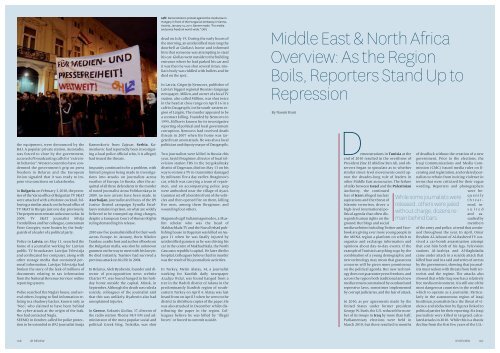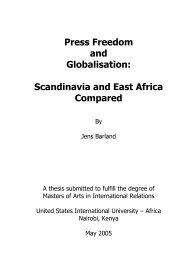FOCUS ON THE AMERICAS - International Press Institute
FOCUS ON THE AMERICAS - International Press Institute
FOCUS ON THE AMERICAS - International Press Institute
You also want an ePaper? Increase the reach of your titles
YUMPU automatically turns print PDFs into web optimized ePapers that Google loves.
the equipment, were denounced by the<br />
BAJ. A popular private station, Autoradio,<br />
was forced to close by the government,<br />
accused of broadcasting calls for “extremist<br />
behavior”. Western countries have condemned<br />
the government’s grip on press<br />
freedom in Belarus and the European<br />
Union signaled that it was ready to impose<br />
visa sanctions on Lukashenko.<br />
In Bulgaria, on February 3, 2010, the premises<br />
of the Varna office of Bulgarian TV SKAT<br />
were attacked with a Molotov cocktail, following<br />
a similar attack on the head office of<br />
TV SKAT in Burgas just one day previously.<br />
The perpetrators remain unknown so far. In<br />
2009, TV SKAT journalist Silvija<br />
Trendafilova and her colleague, cameraman<br />
Peter Georgiev, were beaten by the bodyguards<br />
of a leader of a political party.<br />
Police in Latvia, on May 11, searched the<br />
home of a journalist working for Latvian<br />
public TV broadcaster Latvijas Televizija<br />
and confiscated her computer, along with<br />
other storage media that contained personal<br />
information. Latvijas Televizija had<br />
broken the story of the leak of millions of<br />
documents relating to tax information<br />
from the National Revenue Services’ online<br />
reporting system.<br />
Police searched Ilze Nagla’s house, and several<br />
others, hoping to find information relating<br />
to a shadowy hacker, known only as<br />
“Neo”, who claimed to have been behind<br />
the cyber-attack at the origin of the leak.<br />
Neo had contacted Nagla.<br />
SEEMO, in October, called for police protection<br />
to be extended to B92 journalist Sonja<br />
Kamenkovic from Zajecar, Serbia. Kamenkovic<br />
had reportedly been investigating<br />
a local police official who, it is alleged,<br />
had issued the threats.<br />
Impunity continued to be a problem, with<br />
limited progress being made in investigations<br />
into attacks on journalists across<br />
swathes of Europe. In Russia, after the acquittal<br />
of all three defendants in the murder<br />
of noted journalist Anna Politkovskaya in<br />
2009, no new arrests have been made. In<br />
Azerbaijan, journalist and focus of the IPI<br />
Justice Denied campaign Eynulla Fatullayev<br />
remains in prison, on what are widely<br />
believed to be trumped-up drug charges,<br />
despite a European Court of Human Rights<br />
ruling demanding his release.<br />
2010 saw five journalists killed for their work<br />
across Europe. In January, Boris Nikolov<br />
Tsankov, a radio host and author of books on<br />
the Bulgarian mafia, was shot by unknown<br />
gunmen on the way to meet with his lawyer.<br />
He died instantly. Tsankov had survived a<br />
previous attack on his life in 2004.<br />
In Belarus, Aleh Byabenin, founder and director<br />
of pro-opposition news website<br />
Charter 97, was found hanged in his holiday<br />
home outside the capital, Minsk, in<br />
September. Although the death was ruled a<br />
suicide, colleagues of the journalist said<br />
that this was unlikely. Byabenin also had<br />
unexplained injuries.<br />
In Greece, Sokratis Giolias, 37, director of<br />
the radio station Thema 98.9 FM and administrator<br />
of the most popular social and<br />
political Greek blog, Troktiko, was shot<br />
Left: Demonstrators protest against the media law in<br />
Hungary in front of the Hungarian embassy in Vienna,<br />
Austria, January 14, 2011. Banner reads: "For media<br />
and press freedom world-wide." (AP)<br />
dead on July 19. During the early hours of<br />
the morning, an unidentified man rang the<br />
doorbell at Giolias’s home and informed<br />
him that someone was attempting to steal<br />
his car. Giolias went outside to the building<br />
entrance where he had parked his car and<br />
it was then he was shot several times. Giolias’s<br />
body was riddled with bullets and he<br />
died on the spot.<br />
In Latvia, Grigorijs Ņemcovs, publisher of<br />
Latvia’s biggest regional Russian-language<br />
newspaper, Million, and owner of a local TV<br />
station, also called Million, was shot twice<br />
in the head at close range on April 16 in a<br />
café in Daugavpils, in the south-eastern region<br />
of Latgale. The murder appeared to be<br />
a contract killing. Founded by Ņemcovs in<br />
1995, Million is known for its investigative<br />
reporting of political and local government<br />
corruption. Ņemcovs had received death<br />
threats in 2007 when his home was targeted<br />
in an arson attack. He was also a local<br />
politician and deputy mayor of Daugavpils.<br />
Two journalists were killed in Russia this<br />
year. Sayid Ibragimov, director of local television<br />
station TBS in the Sergokalinsky<br />
district of Dagestan, died on May 13 on his<br />
way to restore a TV re-transmitter damaged<br />
by militants’ fire a day earlier. Ibragimov’s<br />
car, which was carrying a team of repairmen,<br />
and an accompanying police jeep<br />
were ambushed near the village of Ayazi.<br />
Gunmen set off a bomb in front of the vehicles<br />
and then opened fire on them, killing<br />
five men, among them Ibragimov, and<br />
wounding four others.<br />
Magomedvagif Sultanmagomedov, a Muslim<br />
scholar who was the head of<br />
Makhachkala TV and the Nurul Irshad publishing<br />
house in Dagestan was killed on August<br />
11 when he was fatally injured by<br />
unidentified gunmen as he was driving his<br />
car in the centre of Makhachkala, the North<br />
Caucasus republic’s capital. He later died in<br />
hospital. Colleagues believe that his murder<br />
was the result of his journalistic activities.<br />
In Turkey, Metin Alataş, 34, a journalist<br />
working for Kurdish daily newspaper<br />
Azadiya Welat, was found hanged from a<br />
tree in the Hadırlı district of Adana in the<br />
predominantly Kurdish region of southeastern<br />
Turkey on April 4. Alataş was last<br />
heard from on April 3 when he went to the<br />
district to distribute copies of the paper. He<br />
was also attacked in December whilst distributing<br />
the paper in the region. Colleagues<br />
believe he was killed by “illegal<br />
forces” or forced to commit suicide.<br />
Middle East & North Africa<br />
Overview: As the Region<br />
Boils, Reporters Stand Up to<br />
Repression<br />
By Naomi Hunt<br />
D<br />
emonstrations in Tunisia at the<br />
end of 2010 resulted in the overthrow of<br />
President Zine El Abidine Ben Ali, and observers<br />
began to speculate as to whether<br />
similar street-level movements could uproot<br />
the decades-long rule of leaders in<br />
other Middle East autocracies. The failure<br />
of talks between Israel and the Palestinian<br />
Authority, the continued<br />
fear of Iran’s alleged nuclear<br />
aspirations and the threat of<br />
Islamist terrorism, drove a<br />
high-level international political<br />
agenda that often disregards<br />
human rights on the<br />
ground. But blogs and social<br />
media websites including Twitter and Facebook<br />
are giving ever more young people in<br />
the MENA region a platform on which to<br />
organize and exchange information and<br />
opinions about day-to-day events. If the<br />
example of Tunisia is anything to go by, the<br />
combination of a young demographic and<br />
new technology may mean that grassroots<br />
concerns will be given more prominence<br />
on the political agenda. But new technology<br />
does not guarantee press freedom, and<br />
across the region both traditional and new<br />
media remain constrained by outdated and<br />
repressive laws, sometimes implemented<br />
by corrupt judiciaries, and the fear of attack.<br />
In 2010, as per agreements made by the<br />
United States under former president<br />
George W. Bush, the U.S. reduced the number<br />
of its troops in Iraq by more than half.<br />
Parliamentary elections were held in<br />
March 2010, but these resulted in months<br />
of deadlock without the creation of a new<br />
government. Prior to the elections, the<br />
Iraqi Communications and Media Commission<br />
(CMC) issued media rules on licensing<br />
and registration, and ordered journalists<br />
to refrain from inciting violence in<br />
terms that were criticized for their vague<br />
wording. Reporters and photographers<br />
were fre-<br />
While some journalists were<br />
released, others were jailed<br />
without charge; dozens remain<br />
behind bars.<br />
quentlythreatened,insulted<br />
and assaulted<br />
by<br />
members<br />
of the army and police, a trend that continued<br />
throughout the year. In April, Omar<br />
Ibrahim Al-Jabouri of Al-Rasheed TV survived<br />
a car-bomb assassination attempt<br />
that cost him both of his legs. Television<br />
stations Al-Arabiya and Al-Baghdadia<br />
came under attack in a suicide attack that<br />
killed four and in a raid and series of arrests<br />
by the government, showing that journalists<br />
must reckon with threats from both terrorists<br />
and the regime. The attacks also<br />
showed that while Iraq now has a relatively<br />
free media environment, it is still one of the<br />
most dangerous countries in the world in<br />
which to operate as a journalist. Particularly<br />
in the autonomous region of Iraqi<br />
Kurdistan, journalists face the threat of violence<br />
and abduction by figures linked to<br />
political parties for their reporting. Six Iraqi<br />
journalists were killed in targeted, calculated<br />
attacks in 2010. While this is a drastic<br />
decline from the first few years of the U.S.-<br />
106 IPI REVIEW<br />
IPI REVIEW 107

















